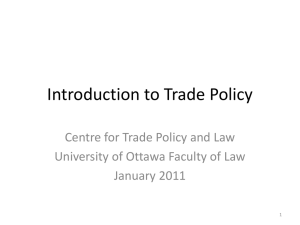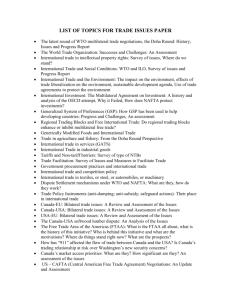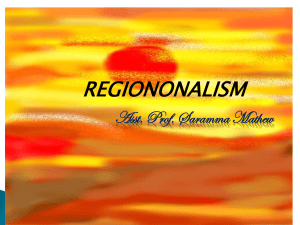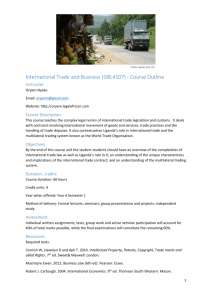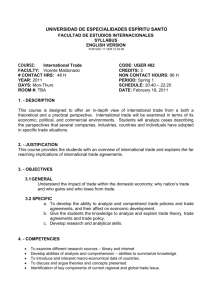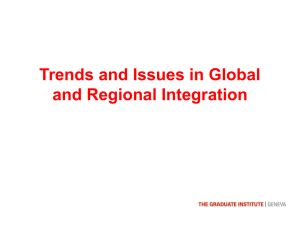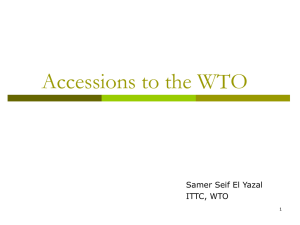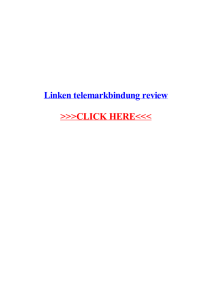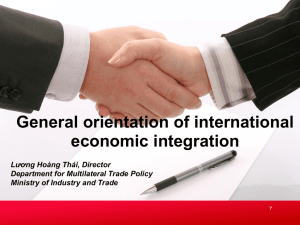IIC 421: International Trade Policy
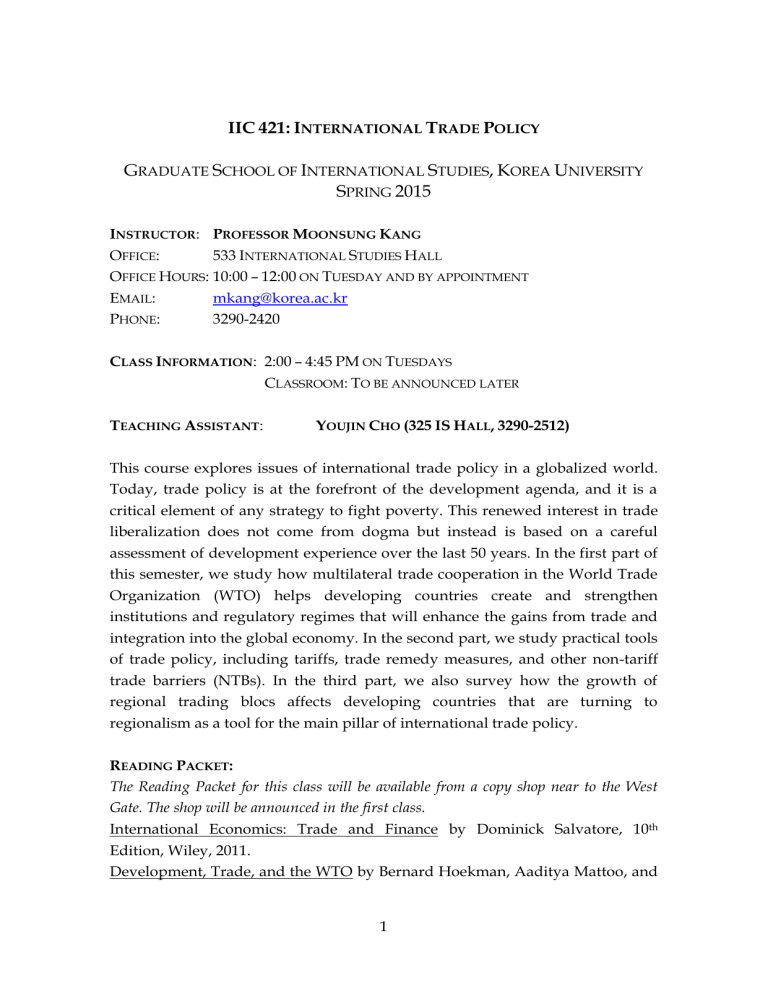
IIC 421: I NTERNATIONAL T RADE P OLICY
G RADUATE S CHOOL OF I NTERNATIONAL S TUDIES , K OREA U NIVERSITY
S PRING 2015
I NSTRUCTOR : P ROFESSOR M OONSUNG K ANG
O FFICE : 533 I NTERNATIONAL S TUDIES H ALL
O FFICE H OURS : 10:00 – 12:00 ON T UESDAY AND BY APPOINTMENT
E MAIL :
P HONE : mkang@korea.ac.kr
3290-2420
C LASS I NFORMATION : 2:00 – 4:45 PM ON T UESDAYS
C LASSROOM : T O BE ANNOUNCED LATER
T EACHING A SSISTANT : Y OUJIN C HO (325 IS H ALL , 3290-2512)
This course explores issues of international trade policy in a globalized world.
Today, trade policy is at the forefront of the development agenda, and it is a critical element of any strategy to fight poverty. This renewed interest in trade liberalization does not come from dogma but instead is based on a careful assessment of development experience over the last 50 years. In the first part of this semester, we study how multilateral trade cooperation in the World Trade
Organization (WTO) helps developing countries create and strengthen institutions and regulatory regimes that will enhance the gains from trade and integration into the global economy. In the second part, we study practical tools of trade policy, including tariffs, trade remedy measures, and other non-tariff trade barriers (NTBs). In the third part, we also survey how the growth of regional trading blocs affects developing countries that are turning to regionalism as a tool for the main pillar of international trade policy.
R
EADING
P
ACKET
:
The Reading Packet for this class will be available from a copy shop near to the West
Gate. The shop will be announced in the first class.
International Economics: Trade and Finance by Dominick Salvatore, 10 th
Edition, Wiley, 2011.
Development, Trade, and the WTO by Bernard Hoekman, Aaditya Mattoo, and
1
Philip English (HME), The World Bank, 2002.
Economic Development and Multilateral Trade Cooperation by Simon J.
Evenett and Bernard M. Hoekman (EH), The World Bank, 2006.
Regional Integration and Development by Maurice Shiff and L. Alan Winters
(SW), The World Bank, 2003.
Trade, Doha, and Development: A Window into the Issues by Richard
Newfarmer, The World Bank, 2006.
The Great Recession and Import Protection: The Role of Temporary Trade
Barriers, edited by Chad. Bown, The World Bank
( http://www.cepr.org/active/publications/books_reports/viewreport.php?cv
no=P228 )
Fair Trade for All, by Joseph E. Stiglitz and Andrew Charlton, Oxford
University Press, 2005. (optional, but it’s a great book)
And Selected Papers.
C
OURSE
O
UTLINE AND
G
RADING
P
OLICY
1.
L ECTURES :
Prerequisite: International Economics
Students are expected to have completed the reading prior to lecture.
Attendance is mandatory at the lectures, and the exam will focus primarily
on material presented in lecture. In this course, each new concept requires a solid understanding of what was taught previously. Therefore, it is essential that you keep up right from the beginning. If you fall behind, it will be very difficult to catch up.
2.
G RADES :
There will be only one exam. Grades will be based on:
Final Exam:
Proposal Presentation: 5%
Term Paper:
60%
35%
NO EXTRA CREDITS IN THE CLASS
3.
I
N
-C
LASS
P
ROPOSAL
P
RESENTATION AND
T
ERM
P
APER
:
Project: Every student will be asked to conduct a research project and to
present any topic related to international trade policy.
2
Proposal: Students need to submit their own proposal, with information of topic, general background, research methodology, (tentative) table of contents, and two preferred dates of presentation, by October 15th (T) in
class.
Presentation: Every student will have 10 minutes to present and then a discussion session will be followed for 5 minutes. Presentation must include: objectives, general background, theories (if any), plans to analyze, and expected results and/or policy implications/recommendations.
4.
T ERM P APER :
The term paper will be 12 – 15 pages, excluding references (double-spaced, 12 font-sized), on the topic that you presented.
Basic Structure of Term Paper: (1) Introduction
(2) Main Part (Body)
(3) Conclusion
(4) References
Due Date: December 3 rd in class
READING LIST
Do the following reading by the dates listed. As the semester progresses, we may revise dates.
Week 1 (March 3) Course Overview
P
ART
O
NE
: M
ULTILATERAL
T
RADING
S
YSTEM
Week 2 (Mar 10) World Trade Organization (WTO)
HME: Chapter 6, WTO booklet
P
ART
T
WO
: T
RADE
P
OLICY
T
OOLS
Week 3 (Mar 17)
Week 4 (Mar 24)
Week 5 (Mar 31)
Tariffs and Market Access Issues I: Trade in Goods
Salvatore: Ch 5, HME: Ch 11, EH: Ch 1
Trade Remedy Measures
Assigned reading; Bown: selected chapters
Nontariff Trade Barriers
Salvatore: Ch 6; other readings
3
Week 6 (Apr 7) Market Access Issues II: Trade in Services
HME: Chapter 24, EH: Chapter 4
Week 7 (Apr 14) S&D Treatment in the WTO and Unilateral Preference
EH: Chapters 5-6
P
ROPOSAL
: D
UE
O
CTOBER
15
Week 8 (Apr 21) N O C LASS DURING M IDTERM W EEK
P
ART
T
HREE
: P
ROPOSAL
P
RESENTATIONS
Week 9 (Apr 28) P ROPOSAL P RESENTATION
Week 10 (May 5) N O C LASS (C HILDREN ’ S D AY )
P
ART
F
OUR
: R
EGIONALISM
Week 11 (May 12) Making the Most of Regional Integration
Lecture Note, SW: Chapter 3
Week 12 (May 19) Investment, Growth and Location
SW: Chapters 4-5
Week 13 (May 26) Regionalism versus Multilateralism
SW: Chapter 8, OECD
P
ART
F
IVE
: F
OREIGN
D
IRECT
I
NVESTMENT
Week 14 (Jun 2)
Week 15 (Jun 9)
General Backgrounds of FDI and MNCs
Related Articles
T
ERM
P
APER
: D
UE
J
UNE
2
Rules on FDI and Policy to Attract FDI
Related Articles
Week 16 (Jun 16) F
INAL
E
XAM
4
